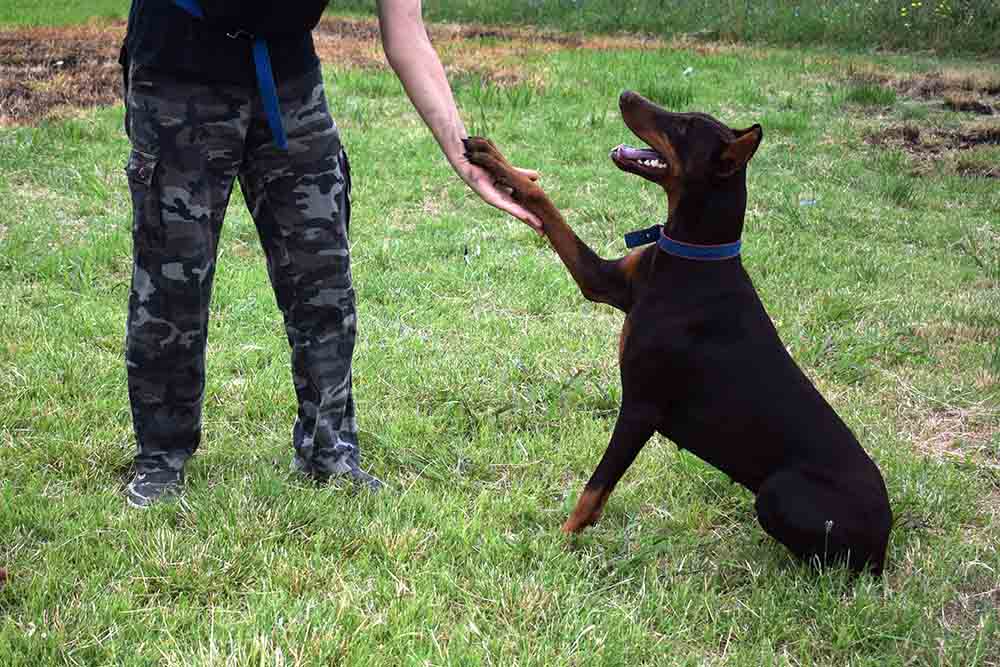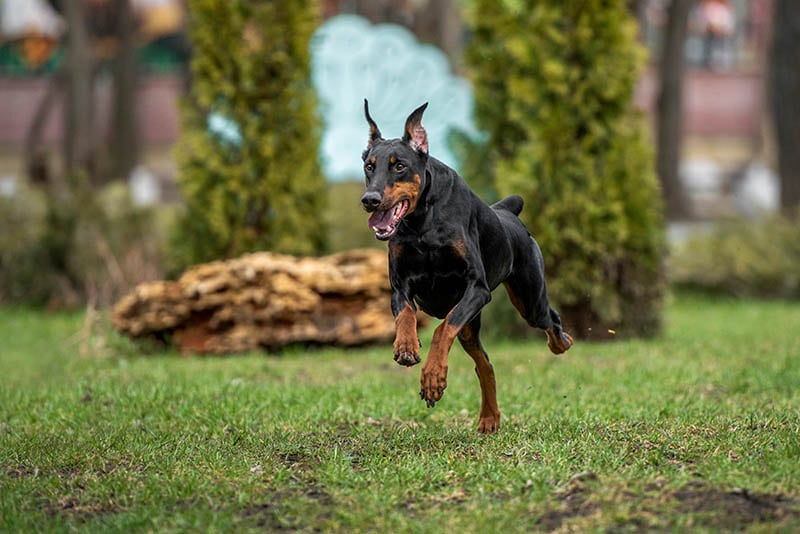How to Train a Doberman – 10 Vet-Approved Tips

By Misty Layne
Updated on

Dobermans can be some of the sweetest, most loyal pups you’ll ever have. But to bring out their affectionate yet protective nature, you’ll need to do a fair amount of training with them first. If you skimp on training and socializing your Doberman, you could end up with a dog that engages in negative behaviors.
Training your Doberman will be a bit of a task since it’s ongoing, but it will be well worth the rewards. To help you out with training, we’re sharing these 10 tips and tricks that will aid you in making the process a smooth one.
Before You Begin
You’ll want to have a few things on hand before you start training your Doberman (and most of these you’ll already have in the house!).
If you have these, you should be good to go. However, if you end up having trouble training your Doberman, whether due to lack of time or just because of a stubborn puppy, you can find a reputable trainer to aid you.
The 10 Tips & Tricks for Training Your Doberman
And here they are—the 10 tips and tricks that will make training your Doberman puppy so much simpler!
1. Maintain patience.
We said you’d need tons of patience before you begin, and it’s true! Training a Doberman will take plenty of patience. This breed is incredibly intelligent and will pick up things easily, but they will also make mistakes along the way. And occasionally, it may take your pup a few tries to get a command or trick down. So, try not to get frustrated, and be sure to keep your cool!

2. Routine is key.
Routine and consistency are important in training any dog breed, but the Doberman, in particular, adores routine. That means you’ll need to do your best to schedule training sessions with your pup at the same time each day. It also means that your regular routine shouldn’t change drastically from day to day. When your Doberman knows what to expect and when it’ll be more open to what you’re attempting to teach it.
3. Slow and steady wins the race.
We know you’re eager to have your Doberman house-trained, crate-trained, and able to get along with any person and animal it meets. But all that will take time for your dog to learn, so don’t try to throw a ton of new commands and training at your pup all at one time. Bombarding your pet with too many new things at once will only confuse and overwhelm it. And don’t try to fit in crazy long training sessions either because you can only hold your dog’s attention for so long. Instead, stick to training sessions that are 5–10 minutes. This is one of those situations where you want to be the tortoise, not the hare!
No matter what dog breed you have, early socialization is vital, but it’s even more so for Dobermans. While Dobermans are no longer the aggressive breed they started out as (since breeders have been breeding those sorts of traits out for a while), they can still lash out if they become frightened or anxious.
And if you skip the socialization for your Doberman, then it could easily become those things when meeting new pets or people or dealing with unfamiliar locations. So, ensure your dog meets plenty of new people and animals during the first few months of its life, and take it with you to various locations, so your pup learns not to be afraid.

5. Use a clicker.
If you’re unfamiliar with clicker training, it’s simply the act of using a clicker to mark positive behaviors. By clicking when your Doberman engages in the behavior you want to teach it, your pet knows exactly when it’s done the correct thing. Follow that up with some treats and praise, and you’ll have a much simpler time getting your pet to learn!

6. Use only positive reinforcement.
Negative reinforcement in training your Doberman won’t do any good or serve any useful purpose. Instead of teaching your dog which behavior is correct, it will teach your dog to be afraid of you and to engage in bad behavior when you aren’t around to yell or punish it. Instead, you’ll want to use positive reinforcement in the form of treats and praise. This will help your Doberman to be eager to continue learning and will aid in forming a solid bond between the two of you.
7. Take care of behavioral issues before they begin.
Every dog will have areas where it has issues. Some of the problem areas Dobermans are prone to are being aggressive or highly skittish. So, be sure to target those areas before they begin or get out of hand by socializing your pet early and introducing them to new people, animals, and places.

8. Incorporate visual cues.
Take your clicker training up a notch by also incorporating visual cues into your training sessions. Dobermans are great with visual cues, so these cues can be incredibly helpful while training. Something as simple as pointing to the floor while you tell them to “sit!” will help get the command across that much clearer. Just be sure you are consistent in what gestures go with what commands so your dog doesn’t get confused!
9. Understand and use your Doberman’s nature.
Dobermans are often called “Velcro dogs,” and for good reason—this breed is extremely loyal and devoted to its family, so these pups will rarely want to leave your side. Another key aspect of the Doberman nature is its willingness to do anything at all for its family; this willingness translates into an eager-to-please nature during training that will make things simpler. Understanding how your Doberman’s nature works and using it to your advantage during training will be extremely useful and make life easier for you both!
10. Engage in regular exercise with your Doberman.
Dobermans have a lot of energy (a whole lot!). So, if they aren’t getting that energy out each day, they may go from sweet and playful to mischievous and rambunctious, which makes training much more difficult. Engaging in daily walks or runs and plenty of playtime will help your dog release all that energy so that it’s calmer during training sessions.

Conclusion
Training your Doberman will take plenty of patience and time, but it should be simpler with these 10 tips and tricks. The most important things to remember are to take things slow and keep a consistent routine, but any combination of these tips and tricks will be helpful. And remember to be patient! Training takes time, but your Doberman will eventually learn everything you’re teaching it.
Featured Image Credit: Wynian, Shutterstock












